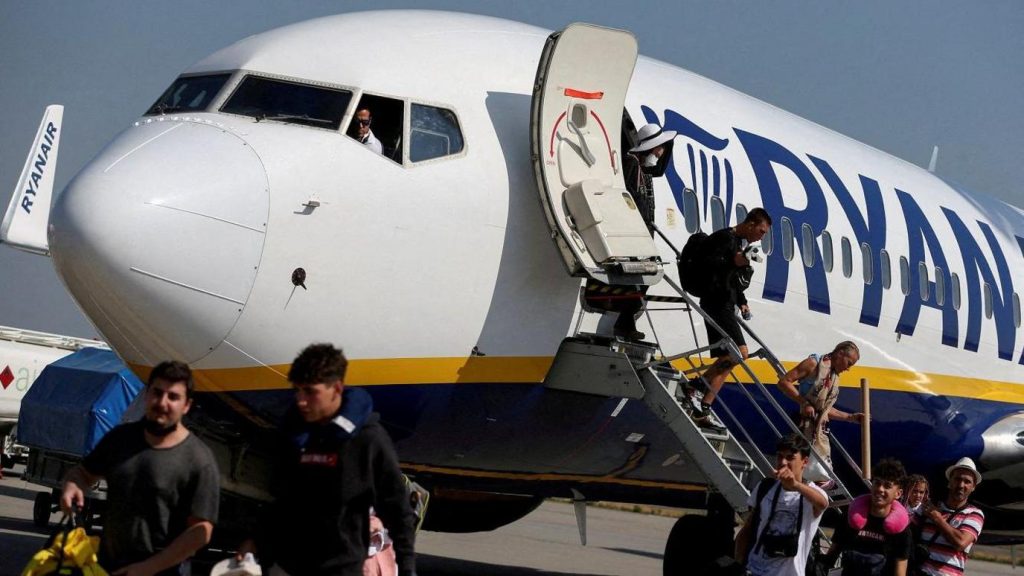Spain fines budget airlines including Ryanair €179m
3 min read
Spain has imposed hefty fines on five major budget airlines, totaling €179 million (£149 million), for what it describes as “abusive practices,” including charging customers for carry-on luggage. The fines have been levied after a thorough investigation by Spain’s Ministry of Consumer Affairs into the airline industry’s pricing and business practices.
Ryanair has been hit with the largest penalty of €108 million (£90 million), followed by EasyJet, which was fined €29 million (£24 million). The other airlines that have been sanctioned include Vueling, Norwegian, and Volotea, with Vueling facing the third-largest fine of €39 million (£32 million), while Norwegian and Volotea were each fined €1.6 million (£1.3 million) and €1.2 million (£1 million), respectively.
The Spanish authorities announced the fines on Friday, citing practices such as the additional charges for hand luggage and the reserving of seats for children. Spain’s Consumer Rights Ministry expressed that such practices mislead consumers, hinder price transparency, and prevent passengers from making informed decisions about which airline to choose. The fines are the result of a review initiated earlier this year, after which Spain upheld the penalties despite appeals from the airlines.
The investigation found that these airlines were engaging in misleading pricing strategies that make it difficult for passengers to compare offers effectively. Ryanair, for instance, faced accusations of violating consumer rights by imposing charges for carry-on luggage, particularly larger items, and for seat selection. Additionally, the airline was found to have imposed exorbitant fees for printing boarding passes at the airport.
The fines are calculated based on the “illicit profit” each airline gained through these practices. For example, Ryanair was accused of extracting disproportionate amounts of money from passengers through excessive fees related to luggage and boarding pass printing. Other charges targeted by the Ministry of Consumer Affairs include the fees for printing boarding passes at airports, which some airlines were found to charge up to €20 for—a practice that the Spanish government has condemned as abusive.
Ryanair’s CEO, Michael O’Leary, immediately rejected the fines, calling them “illegal” and “baseless.” He expressed his intention to appeal the decision and take the matter to European Union courts. O’Leary defended Ryanair’s practice of charging for luggage and check-in services, claiming that these fees allowed the airline to pass on savings to customers through lower ticket prices. He added that the airline has used such fees for years to encourage passengers to change their behavior, such as choosing to pack lighter.
EasyJet and Norwegian, both of which were also fined, have announced that they intend to appeal the fines. The Spanish airline industry association ALA also expressed its opposition, calling the penalties “nonsense” and arguing that the fines violate European Union free market rules.
However, Andrés Barragán, the Secretary General for Consumer Affairs and Gambling at Spain’s Ministry of Consumer Affairs, defended the government’s position. He stated that the fines were fully justified under both Spanish and EU law. Barragán specifically criticized the practice of charging passengers for services like boarding pass printing, which he argued is both an unnecessary and exploitative fee. “It is an abuse to charge €20 just for printing the boarding card at the airport,” he told the BBC’s World Business Report, highlighting that this issue is widespread not only in Spain but across other EU nations as well.
The consumer rights association Facua, which has long campaigned against such fees, hailed the fines as “historic.” Facua has been vocal for years in protesting additional charges for services such as carry-on luggage and check-in, arguing that such fees exploit consumers and obscure the true cost of flying.
The penalties come amid growing concerns across Europe about the transparency and fairness of airline pricing. Passengers have increasingly criticized low-cost carriers for charging high fees for essential services, often making it difficult to understand the full cost of a ticket until the final stages of booking. This issue has sparked debates about whether airlines should be required to include all fees in the initial advertised price.
In light of the fines, the Spanish Ministry of Consumer Affairs has stated that it intends to continue monitoring the practices of airlines, with the aim of protecting consumers from exploitative pricing tactics. The ongoing debate over airline pricing and transparency is likely to continue as the European Union and individual member states address the issue of “hidden fees” in the airline industry.







